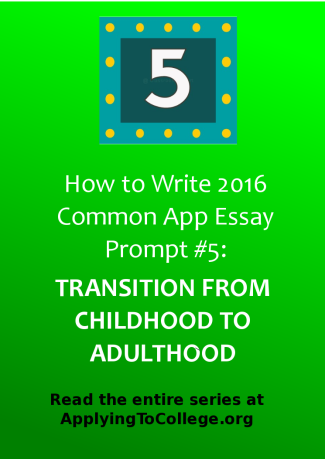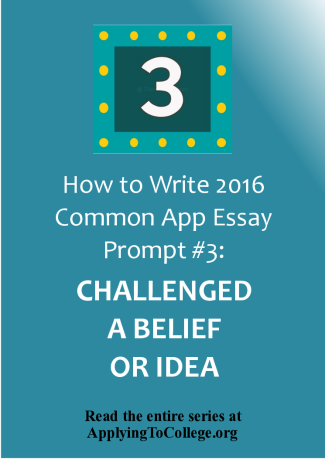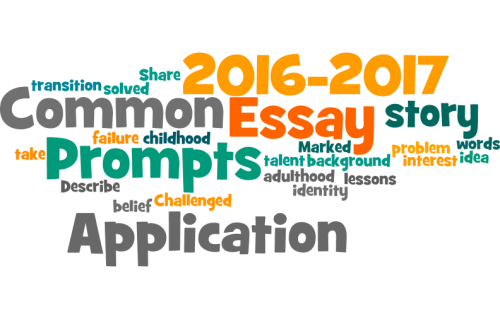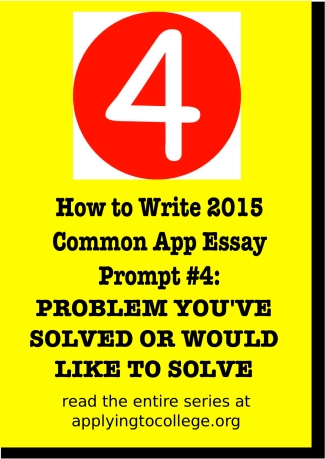 The Common Application essay prompts are out.
The Common Application essay prompts are out.
How do you choose which essay to write?
In this 5 part series I help you figure out which question on the 2016 Common Application essay is right for you.
- For the complete list of 2016 Common App essay questions click here.
We’re down to the last one. Whew!
Ready for #5? Let’s do it!
Common Application Essay Prompt #5:
Discuss an accomplishment or event, formal or informal, that marked your transition from childhood to adulthood within your culture, community, or family.
Is this Prompt for You? Look at the Keywords:
“Accomplishment or Event” … “Transition from Childhood to Adulthood” … “Culture, Community or Family”
What the Keywords Mean:
- “Accomplishment or event” is a very broad phrase. That’s good! It means you can choose almost anything you’ve done, experienced or accomplished.
- “Transition from childhood to adulthood.” Don’t feel quite like an adult yet? That’s okay—you can still answer the question. The Common App really wants to know how you’ve become more mature or responsible over time.
- Ask yourself these questions: Have you taken on more responsibility? Do you make decisions in a more mature way? Are you more dependable? Do you teach younger students what you’ve been taught? Does your family or community ask you for advice on an issue you’ve become knowledgeable about? Have you been through a religious or cultural rite of passage that was meaningful to you? There are many ways we grow into adulthood.
Still Looking for a Topic?
- Here are a few more questions you can ask yourself: Did you set a goal for yourself that you achieved? Did you work hard at a task, hobby, or skill that you eventually were able to master? Did you have a relationship with an important person that helped shape you? Did you have a life event that forced you to take on more responsibility? Did you have an experience that helped you become more compassionate or understanding? Did you experience a traumatic event that made you see the world in a different way? Did you need to find a way to get yourself out of a difficult situation? Did you start your own business? Did you learn how to allocate your own money? These are just a few ideas—make sure to keep thinking!
Pitfalls to Avoid:
- Don’t forget to include a learning experience. Although the prompt doesn’t specifically ask for it, colleges want to know how you grew or what you learned from your experience. How did your experience shape your attitude, outlook or actions? How did it help you become the person you are today? Make sure to tell them.
Essay Topic Example
“Dance Studio”
A young woman began dancing before she could tie her shoes. The tradition at her dance studio was that the older dancers mentored the younger ones. As she grew older and became more accomplished, she started teaching the younger students. Now she helps them in the studio and outside of dance. As she has matured, the student has learned what it takes to be a friend and mentor, and is helping continue her dance studio’s tradition.
Is this Example Successful? Yes.
- All the keywords are addressed.
- The student writes about an accomplishment in her community.
- Her transition from child to young adult is marked by taking on more responsibility and becoming a teacher and mentor to the younger dancers.
- She learned from her experience.
- The student has matured and become more responsible.
What Can Colleges Learn About You From This Question?
- Your level of maturity.
- Schools can get a feeling for how well you will interact with your peers and instructors, your decision-making abilities, and even your possible leadership skills.
- Your ability to develop important relationships within your family, culture, or community.
- Schools can learn what kind of community member you will be at college.
- Schools can learn what kind of community member you will be at college.
- The kind of idea or experience that’s truly meaningful to you.
- Your essay topic tells the school a great deal about what’s important to you. Make sure you choose a topic that is meaningful to you and says good things about you.
- Your essay topic tells the school a great deal about what’s important to you. Make sure you choose a topic that is meaningful to you and says good things about you.
We’re done! We’ve covered all the prompts. If you’ve read the blog posts I’ve written on how to answer each question, you should be able to choose the right topic and write an essay that makes you shine. If you have any questions, drop me a line and let me know.


















